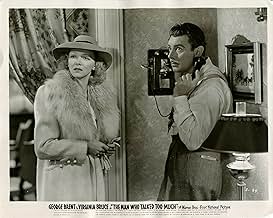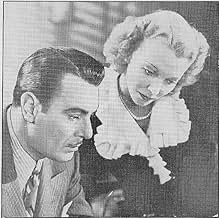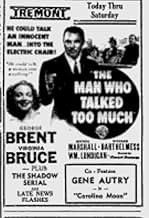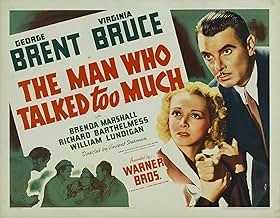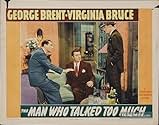NOTE IMDb
6,3/10
427
MA NOTE
Ajouter une intrigue dans votre langueA DA quits after wrongly convicting an innocent man. His secretary joins his new law firm, which prospers through mob ties. His brother John joins but discovers corruption and helps the feds... Tout lireA DA quits after wrongly convicting an innocent man. His secretary joins his new law firm, which prospers through mob ties. His brother John joins but discovers corruption and helps the feds, leading to his own false murder conviction.A DA quits after wrongly convicting an innocent man. His secretary joins his new law firm, which prospers through mob ties. His brother John joins but discovers corruption and helps the feds, leading to his own false murder conviction.
- Réalisation
- Scénario
- Casting principal
Edwin Stanley
- District Attorney Nelson
- (as Ed Stanley)
Kay Sutton
- Mrs. Knight
- (scènes coupées)
Avis à la une
Boy, once Warner Brothers got their hands on a script, they remade it until the type faded from the page.
"The Man Who Talked Too Much" is a 1940 film that is a remake of a 1932 film, "The Mouthpiece" starring Warren William. I haven't actually seen "The Mouthpiece," and the trivia here says that this script wasn't completed at the time of production, so I'm assuming this is a reworking. In 1955, this movie was remade as "Illegal" starring Edgar G. Robinson, which I saw and liked, with the exception of one plot hole.
The basic story is this: A district attorney, Steven Forbes (George Brent) sends an innocent man to the gas chamber, quits, and becomes a defense attorney. He has a hard time making ends meet until he becomes an attorney for the mob. Once he hits the big time as a mob lawyer, he hires an assistant, Celia, and his brother John. John (William Lundigan) and Celia (Brenda Marshall) fall in love. John is concerned about the honesty of the firm, but his efforts to correct the situation get him into big trouble.
Though the basic premise is the same in each story, in "Illegal," the brother business is changed and the person in trouble is his assistant, played by Nina Foch.
This is an okay story. Despite the holes in "Illegal," I liked it better, Robinson being a stronger actor than George Brent.
"The Man Who Talked Too Much" is a 1940 film that is a remake of a 1932 film, "The Mouthpiece" starring Warren William. I haven't actually seen "The Mouthpiece," and the trivia here says that this script wasn't completed at the time of production, so I'm assuming this is a reworking. In 1955, this movie was remade as "Illegal" starring Edgar G. Robinson, which I saw and liked, with the exception of one plot hole.
The basic story is this: A district attorney, Steven Forbes (George Brent) sends an innocent man to the gas chamber, quits, and becomes a defense attorney. He has a hard time making ends meet until he becomes an attorney for the mob. Once he hits the big time as a mob lawyer, he hires an assistant, Celia, and his brother John. John (William Lundigan) and Celia (Brenda Marshall) fall in love. John is concerned about the honesty of the firm, but his efforts to correct the situation get him into big trouble.
Though the basic premise is the same in each story, in "Illegal," the brother business is changed and the person in trouble is his assistant, played by Nina Foch.
This is an okay story. Despite the holes in "Illegal," I liked it better, Robinson being a stronger actor than George Brent.
As much as Americans express pride in their political and legal system, it is also true that they hold politicians and attorneys in very low esteem. The popular perception of lawyers as unethical and devious is not new and here it permeates this modest 1940 feature. What George Brent does on the screen has little connection to reality (there is one particularly silly scene in which he grandstands by ingesting poison during a murder trial), but sets the stage for his reformation and a happy ending.
The movie flies by so it may be worth 76 minutes of a viewer's time as a reminder of Hollywood's long-standing tradition of disparaging the legal profession.
The movie flies by so it may be worth 76 minutes of a viewer's time as a reminder of Hollywood's long-standing tradition of disparaging the legal profession.
This opens with lawyer George Brent probing a man guilty in court. The guy is sent to prison and is readied for the electric chair. New evidence comes to light: He is innocent. There are frantic attempts to reach the warden. But they;re unsuccessful. An innocent man has been killed as we watch the flicker of the chair.
This all happens in the first few minutes. It's giving nothing away. The rest of the movie involves Brent's deciding to make some money and starting to defend shady characters. His loyal secretary Virginia Bruce goes with him. (What a beauty she was! Such a haunting look.) His brother William Lundigan has graduated from law school. Etc. Brenda Marshall has too small a role. It hops the track but in some ways is an early noir.
This all happens in the first few minutes. It's giving nothing away. The rest of the movie involves Brent's deciding to make some money and starting to defend shady characters. His loyal secretary Virginia Bruce goes with him. (What a beauty she was! Such a haunting look.) His brother William Lundigan has graduated from law school. Etc. Brenda Marshall has too small a role. It hops the track but in some ways is an early noir.
The Man Who Talked Too Much presumably refers to George Brent, who plays a district attorney who sends an innocent man to the death house. To compensate for his mistake he becomes a struggling defense lawyer, eventually taking on some nasty gangland types in order to make ends meet. The film starts in terrific fashion and is well acted and written throughout, but it eventually bogs down into a standard 'B' plot of frame-ups and revenge. Nevertheless I recommend this to anyone interested in second features, and it certainly has the grit one expects of Warner crime films. Watch for Marc Lawrence in one of his patented bad guy roles.
A man whom Assistant District Attorney George Brent convicted for murder dies in the electric chair. Then Brent discovers he was innocent. So he goes into private practice; it's better that a hundred guilty men go free than an innocent man go to jail. But his clients can't pay their bills. Then along comes gangster Richard Barthelmess, and he pays his bills. But when Brent's brother, William Lundigan, is sentenced to die for a murder one of Barthelmess' hoods committed, can Brent do anything?
It's a remake of 1932's THE MOUTHPIECE, and like many of Brian Foy's B productions, moves along at a good clip. Brent is good in the part, solid if a tad stolid, and backed by a cast that includes Virginia Bruce, Brenda Marshall, George Tobias, and John Litel. But that competent speed never quite reaches the point of panic, and the movie seems lightweight as a result.
It's a remake of 1932's THE MOUTHPIECE, and like many of Brian Foy's B productions, moves along at a good clip. Brent is good in the part, solid if a tad stolid, and backed by a cast that includes Virginia Bruce, Brenda Marshall, George Tobias, and John Litel. But that competent speed never quite reaches the point of panic, and the movie seems lightweight as a result.
Le saviez-vous
- AnecdotesFrank J. Collins based his protagonist on Manhattan defense attorney William Joseph Fallon, dubbed "The Great Mouthpiece" by the 1920's New York press, who had a short but spectacularly successful career before succumbing to the effects of his own dissoluteness at the age of 41.
He has been cited as one of the inspirations for the celebrity lawyer Billy Flynn in the popular musical Chicago. He is also portrayed for six episodes by David Aaron Baker in the HBO television series Boardwalk Empire (2010).
- ConnexionsReferences Vingt mille ans sous les verrous (1932)
Meilleurs choix
Connectez-vous pour évaluer et suivre la liste de favoris afin de recevoir des recommandations personnalisées
Détails
- Date de sortie
- Pays d’origine
- Langue
- Aussi connu sous le nom de
- El que habló demasiado
- Lieux de tournage
- Société de production
- Voir plus de crédits d'entreprise sur IMDbPro
- Durée
- 1h 16min(76 min)
- Couleur
- Rapport de forme
- 1.37 : 1
Contribuer à cette page
Suggérer une modification ou ajouter du contenu manquant



